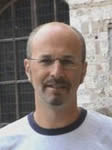INVITED SPEAKERS

Enrico Motta, Professor of Knowledge Technologies
Director, Knowledge Media Institute, The Open University
Knowledge Media Institute [KMi], The Open University,
Milton Keynes,
MK7 6AA,
United Kingdom.
Phone: +44 (0) 1908-65-3506
Fax: +44 (0) 1908-65-3169
Email:
Website: http://kmi.open.ac.uk/people/motta/
Invited Talk - Exploiting large-scale semantics on the web
There is a lot of evidence indicating that the semantic web is growing very rapidly. For example, an IBM report published last year indicated a 300% increase between 2003 and 2004 and pointed out that the rate of growth of the semantic web is mirroring that of the web in its early days. Indeed, repositories such as Swoogle already contain thousands of ontologies and hundreds of millions of RDF triples. Thus, a large scale semantic web is rapidly becoming a reality and therefore we are quickly reaching the point where we can start thinking about a new generation of intelligent applications, capable of exploiting such large scale semantic markup. Of course, while the semantic web provides an exciting opportunity, it also introduces very complex challenges. For example, the available semantic markup is extremely heterogeneous both with respect to its ontological profile and also to its degree of quality and to the level of trust that can be assigned to it. These features of the semantic web introduce an element of complexity, which was absent from traditional knowledge-based systems, where data quality was under the control of the developers, and provenance and heterogeneity did not apply. In my talk I will discuss these issues in some detail, and in particular I will describe the emerging semantic landscape and highlight some of the distinctive features characterizing the new generation of applications, which will be enabled by a large scale semantic web. In my presentation I will also present some concrete initial prototypes of this new generation of semantic applications, which exploit available large scale web semantics, to provide new ways to support question answering, information extraction and web browsing.
Prof. Enrico Motta is Professor in Knowledge Technologies and Director of the Knowledge Media Institute (KMi) at the Open University in UK. Prof. Motta has a 1st Degree in Computer Science from the University of Pisa in Italy and a PhD in Artificial Intelligence from the Open University. His current research focuses primarily on the integration of semantic, web and language technologies to support the development of intelligent web applications, which exploit the large scale data provided by the emerging semantic web. Over the years, Prof. Motta has led KMi’s contribution to numerous high-profile projects, such as the highly prestigious, EPSRC-funded Interdisciplinary Research Collaboration on Advanced Knowledge Technologies (AKT), as well as several EU-funded ones, most recently NeOn, X-Media, and Open Knowledge. Prof. Motta is Editor in Chief of the International Journal of Human Computer Studies and is also on the editorial board of IEEE Intelligent Systems and the Journal of Web Semantics. He founded the ground-breaking European Summer School on Ontological Engineering and the Semantic Web, which is now in its fourth edition. He is the author of 140 refereed publications and a book, Reusable Components for Knowledge Modelling, published by IOS Press. Prof Motta chaired the 14th International Conference on Knowledge Engineering and Knowledge Management (EKAW 2004) and was the Programme Chair of the 4th International Semantic Web Conference (ISWC 2005).

Fabio Ciravegna, Professor of Language and Knowledge Technologies,
University of Sheffield
Regent Court,
211 Portobello Street,
Sheffield, S1 4DP,
United Kingdom
Tel: +44 (0) 114-22-21940
Fax: +44 (0) 114-22-21810
Email: ,
Website: http://www.dcs.shef.ac.uk/~fabio/
Invited Talk - Acquiring and Sharing Knowledge in Large Organizations: Issues, Requirements and Methodologies
Acquiring and Sharing Knowledge in Large Organizations: Issues, Requirements and Methodologies
Fabio Ciravegna, University of Sheffield
Efficient and effective Knowledge Acquisition and Sharing are of vital importance for large organizations.
Complex human and technical aspects make them a complex issue.
In this talk I will describe and discuss requirements, tools and methodologies for Knowledge Acquisition
and Sharing in large organizations. I will use examples from the aerospace and automotive domain to describe
and discuss real world requirements, including those related to human factors and technical issues. Then I will
describe techniques from the field of Human Language Technologies and the Semantic Web that can be used for addressing
those requirements. I will then present examples of real world applications developed in the aerospace domain. Finally,
I will discuss some future trends.
Fabio Ciravegna is Professor of Language and Knowledge Technologies at the University of
Sheffield where he coordinates the Web Intelligence Technologies (WiT) lab
(http://nlp.shef.ac.uk/wig/),
a 15 researcher lab. WIT is part of the Natural Language Processing group, one of the largest groups of
this type in Europe. His research field concerns Human Language, Machine Learning and Semantic Web technologies
for Knowledge Management.
He is the project director of the EU-funded integrated projects X-Media, a 15 partner, €13M budget
project on large scale knowledge management across multiple media (http://www.x-media-project.org).
Other active projects: